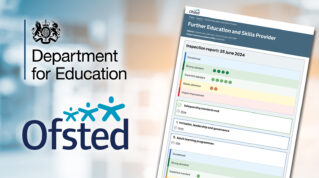Ofsted is considering renaming the proposed ‘secure’ grade in its new report cards, although leaders say it won’t be clear where it sits on the new scale, FE Week understands.
The inspectorate proposes replacing its current four-point grading system with five grades across up to 20 judgment areas. The system is now being piloted and is open to consultation,
Providers would be given one of five colour-coded judgments for each area, ranging from dark green to red. Under current plans, those would be ‘exemplary’, ‘strong’, ‘secure’, ‘attention needed’ and ‘causing concern’.
However, although it remains wedded to five grades, Ofsted is now understood to be considering replacing ‘secure’ with another word or phrase.
FE Week understands the matter was discussed with inspectors by Sir Martyn Oliver, the chief inspector, and Lee Owston, the watchdog’s director of education, at an internal conference last week.
It follows concerns raised with Ofsted that the meaning of ‘secure’ in the context of rating a school or FE provider is not clear, and it is not obvious where it should sit on the sliding scale.
Pepe Di’Iasio, the general secretary of the Association of School and College Leaders, welcomed Ofsted’s willingness to rethink elements of its proposals, but said it needed “to go much further than simply a change in terminology”.
Ofsted’s plan for a five-point grading scale was “fundamentally flawed” and risked producing less reliable judgments while putting additional pressure on school and college leaders.
“The proposed toolkits are wildly open to interpretation, with the distinction between ‘secure’ and ‘strong’ in particular being exceptionally vague in several places,” he said.
Frank Norris, a former senior inspector, said Ofsted was “trying to keep face when actually … the criticism isn’t with the word ‘secure’.
“How sad that they’re spending time on that word when it’s not that word, it’s the actual structure of the grading system.”
It comes after Oliver told leaders at the ASCL conference last month that Ofsted was looking at better “defining the differences between grades”.
Under its proposed new framework, Ofsted has published “inspection toolkits” that break down the requirements schools and FE providers must meet for each of the five grades.
Oliver said the kits aimed to “remove any mystery or guesswork”, helping leaders and teachers “understand each standard in exactly the same way as…inspectors”.
Ofsted is testing the framework with about 240 “visits” to education settings.
Oliver said there had been positive feedback, “but we are also hearing that we have more to do on defining the differences between grades, particularly between secure and strong”.
He told ASCL’s conference that clarification work “has begun”.
Asked if it planned to change the ‘secure’ rating, Ofsted responded: “The consultation is still live. No decisions of this kind have been made.”
The consultation ends on April 28.
















Secure is far less damaging than requires improvement, if dropped it would make sense to go back to satisfactory. Don’t hit schools and the FE sector with something that drains confidence.
Why grade in the first place. Why not ave a competency framework?
It would be good to have a competency framework. For each of the areas receiving a report card there should be a list of competencies that the area needs to demonstrate. The report card will then identify any areas that need work. Everyone needs to work towards competence in all areas and any areas that have difficulty in demonstrating any particular competence will attract the appropriate support.
This approach has many advantages. Most importantly it will be clear what criteria people are required to meet in helpful detail. It will help areas to effectively self assess against the given criteria and it will identify where the organisation needs to put its resources to improve.
Abandoning the grading system doesn’t mean we can’t pursue excellence. All organisations should promote a culture of continuous improvement. indeed a key competency should be the ability to reflect on one’s own work and identify any areas for improvement as well as areas of good practice. The labelling ethos that accompanies grading systems is generally not compatible with this. Competent staff want to improve their own performance and take responsibility for their own development.
A focus on ensuring that all teachers are competent and reflective, and working in a community where learning is valued and shared will give us the high ‘quality provision that we seek.
I fully agree with Angela. A competency based framework would add clarity to what is required and support less ambiguity around how to achieve the grade and better opportunities for accuracy of self assessment.
There has been little discussion around the exemplary grading. When I was first inspected by the FEFC Quality Assurance was decribed as ‘exemplary to the sector’. The outstanding grade was confirmed there and then, not having to be confirmed by some faceless panel as is being proposed. Is it because inspection teams are not seen as competent to do so? At present Ofsted give no areas for improvement when having an overall outstanding grade, even though they may have graded an area such as apprenticeships as only good, meaning there must be areas to improve?